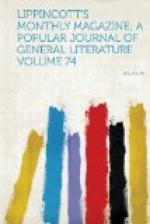TOBE HODGE.
ON A NOBLE CHARACTER MARRED BY LITTLENESS.
As Moscow’s splendors trench on narrow lanes,
The wonder, brimming every traveller’s
eyes,
To disappointment’s sudden darkness wanes
At finding meanness near such grandeur
lies.
O human city! built on Moscow’s plan,
Thy great and little touch each other
so,
Let me forbear, and, as an erring man,
Make my approaches wisely, from below,
Hasting through all the narrow and the base
Before I stand where all is high and vast:
After the dark, let glory light my face,
Thy shining greatness break upon me last.
CHARLOTTE FISKE BATES.
THE SCOTTISH CROFTERS.
It is hard to dispel the halo which poetry and romance have thrown about the Scottish Highlander and see him simply as he appears in every-day life. And indeed, all fiction aside, there is in his history and character much that is most admirable and noble. On many a terrible battle-field his courage has been unsurpassed. His brave and tireless struggle for existence where both climate and soil are unfriendly is equally worthy of respect. Then, too, his sterling honesty and independence in speech and action and his high moral and religious qualities combine to make him a valuable citizen.
Such considerations account in part for the interest which has been excited in England by the claims of the Scottish crofters. There are, however, other reasons why so much attention has of late been given to their complaints. Their poverty and hardships have long been known in England. The reports made by the Emigration Commissioners in 1841 and by Sir John McNeil a few years later contain accounts of miserably small and unproductive holdings, of wretched hovels for dwellings, of lack of enterprise and interest in making improvements, of curtailment of pasture, of high rents and insecurity of tenure, very similar to those found on the pages of the report of the late Royal Commission. While in this interval the condition of the crofters has but slightly, if at all, improved, there has been a very considerable improvement in the condition of the middle and lower classes of the people in other parts of Scotland and in England. The masses of the people have better houses, better food and clothing, while with the development of the school system and the newspaper press general intelligence has greatly increased. The accounts of the poverty and wretchedness of the crofters now reach the public much more quickly and make a much deeper impression on all classes than they did forty years ago. While these small farmers are not numerous,—there are probably not more than four thousand families in need of relief,—many of their kinsmen elsewhere have acquired wealth and influence and have been able to plead their cause with good effect. In this country “The Scottish Land League” has issued in “The Cry of the Crofter” an eloquent plea for help to carry on the agitation to a successful issue.




